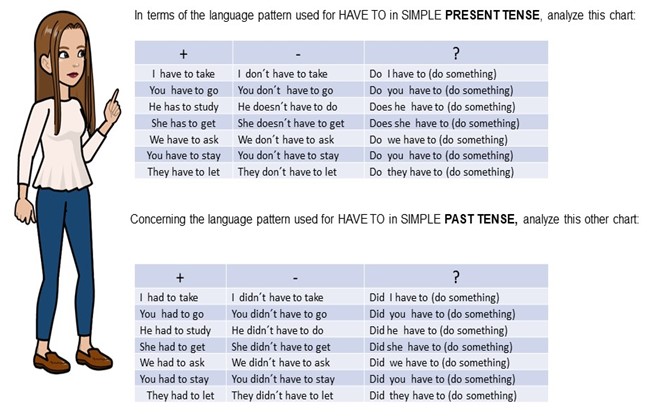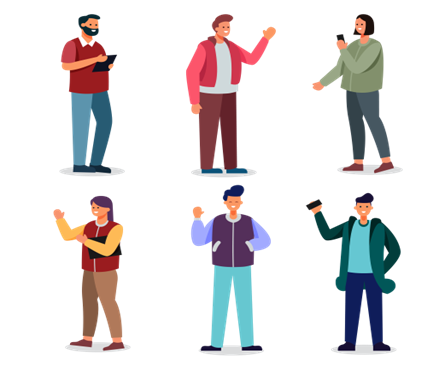I. IS “MUST” A MODAL VERB?

Absolutely! As you probably remember, modal verbs are different from the rest of verbs because they carry a special meaning or intention, added to main verbs. They always keep the same format for all subjects. They do not take up a conjugation and they are always followed by a verb in base form. In general, must or its negative form must not, is a modal auxiliary that is used to express the following purposes:
- OFFICIAL RULES
Written rules that are the same for everyone.
- DUTIES OR MORAL OBLIGATIONS
Responsibilities that exist for population in general.
- PERSONAL OPINION
Opinions that are shared as very strong recommendations.
Here are some examples:
- OFFICIAL RULES
In Mexico, you must be 18 years old to vote.
- DUTIES OR MORAL OBLIGATIONS
You must pay your rent on time.
- PERSONAL OPINIONS
If you visit Monterrey, you must go to Parque Fundidora. You can´t miss it!
II. IS “HAVE TO” A MODAL VERB?
Well, ‘have to’ is half- a modal verb, since it needs to be conjugated. It is used to express the following purposes:
- NEEDS
It is used to express when something is necessary to be done.
- EXTERNAL RULES OR OBLIGATION
We use this expression when somebody in an authority position gives an order.
- FACTS
More than expressing a personal opinion, whoever uses this expression is commanding another person to do something.
Here are some examples:
- NEEDS
I have to schedule a meeting with my colleagues this week.
- EXTERNAL OBLIGATION
We have to finish the report by Monday, at the latest.
- FACTS
You have to show your ID when you enter the Test Room.

III. KEY POINTS TO KEEP IN MIND
Although must and have to are both used to express obligation, responsibility or necessity when used in an affirmative way, their negative structures have a very different meaning.
IV. CONSOLIDATION I.
V. EXERCISE I.
VI. READING TEXT.
READING COMPREHENSION AND VOCABULARY BUILDING

SOME LIFE SKILLS A FUNCTIONING ADULT MUST MASTER
(I) There is no handbook for adult life. Somehow, you are just supposed to know that you must have more money coming in than going out and that you must not wear a fuzzy orange sweater to a job interview. We have put together our own handbook (of sorts) for anyone transitioning from their 20s to their 30s, which lists many of the skills you will need to survive as an adult in the modern world. It is based in part on the 2015 Quora thread, "What are some of the most useful skills to know?" as well as scientific research and expert opinion. We can't promise we've outlined every needed skill. But if you have mastered these, you're probably off to a good start.
(II) Accept feedback gracefully.
"For most of us, it is hard to hear how we made a mistake or could have done something better," writes Quora user Pedram Keyani. "An amazing skill (which you can learn through practice) is to set aside your emotional response in the moment and focus on the information presented to you. Some of it will be valid and some of it invalid, but let your brain decide that, not your ego."
Depending on what kind of feedback you are receiving, there are different strategies for responding with a cool head. For example, if your boss points out what she thinks is an error and you are not sure she's correct, you can say, "I hadn't thought of that, and I'm going to look into it right away."
(III) Manage your time wisely.
There will probably never be a time in your life when you are not juggling multiple personal and professional priorities. Time-management skills are a must, unless you want to feel constantly frazzled. Perhaps the most important time-management lesson is that you should stick with one task at a time. Research suggests that multitasking is generally counterproductive, because the brain expends energy as it readjusts its focus from one activity to another.
(IV) Say 'no' respectfully.
Many of us fear saying the word "no" because we don't want to let other people down. But when you're already swamped and your coworker asks you to take an hour to help him with his project report, "yes, of course" might not be the best answer. "It might sound like a cliché but saying NO when needed can save you lots of time, confusion, guilt, attachment, commitments, stress, and other social evils," writes Yogi Raj.
(V) Get comfortable asking for help.
There is nothing shameful about asking for a little advice or assistance, especially at work. In fact, research suggests that soliciting advice can make you look more competent. That is likely because people feel flattered that you turned to them in the first place. If you are looking for general career advice, entrepreneur and author Tim Ferriss said that it is best to ask someone who became successful quickly and against the odds, instead of someone with a more conventional story.
(VI) Mend your own clothes.
Button popped off your shirt at work? There is no need to panic if you're handy with a needle — which you must be. "Learn how to stitch that button to your shirt collar or sew back the tear on your sleeve from the edge of the table," writes Zehra Alvi. "You will save a lot of money by just knowing how to handle that two-centimeter sword."
(VII) Spend more time alone.
If you are planning to live alone, which many Americans do today, you must accept that you will occasionally feel lonely. It is nothing to be ashamed of or upset by, but it might be a signal that you must incorporate some more socializing into your daily schedule.
VII. PRACTICE I.
VIII. BIBLIOGRAPHY.
Azar, B. S., Azar, D.A., & Koch R.S. (2009). Understanding and Using English Grammar. Longman.
Barker C. and Mitchell, L. (2004). Mega 1 (First Ed.). Macmillan Publishers.
Hewings, M. (2013) Advanced Grammar in Use with Answers: A Self-Study Reference and Practice Book for Advanced Learners of English. Cambridge University Press.
Murphy, R. (2012). English Grammar in Use. Ernst Klett Sprachen.
Murray, L. (2014) English Grammar. Cambridge University Press.
IX. WEB RESOURCES
Images_Compra propia de licencias de banco de imágenes de Pixton y Pngtree, exentas de derechos de autor. https://www-es.pixton.com/ & https://es.pngtree.com/free-backgrounds.
x CREDITS
- All practice exercises and charts were written by _2022_ENES- LEÓN-UNAM
- Audio version performed by Kimberly, Isabella, John and Matt_Compra propia de licencia de uso de voces en Voicemaker, exenta de derechos de autor. https://voicemaker.in/ _Connie Reyes Cruz_2022_